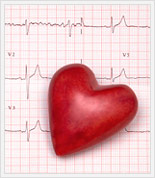|
|
Interpreting Blood Pressure
QUESTION:
My doctor said that I was pre-hypertensive. What do the top and bottom numbers mean and will exercise really help lower my blood pressure?
ANSWER:
 If you were told that your blood pressure was pre-hypertensive, then it was most likely in the range of 120-139 over 80-89 mmHg. The top number is your systolic blood pressure and the bottom number is your diastolic blood pressure. Your heart is a muscle pump that propels your blood through your body by way of vessels, supplying all your body parts with necessary oxygen and nutrients, and carrying away waste products. When your heart is squeezing (i.e., contracting) the pressure that is registered in your arteries is referred to as systolic. When your heart is relaxed and refilling with blood, the pressure that is registered in your arteries is referred to as diastolic. Blood pressure can increase when there is increased resistance to blood flow. This increased resistance can be caused by things such as hardening of the arteries or excess weight gain. If you were told that your blood pressure was pre-hypertensive, then it was most likely in the range of 120-139 over 80-89 mmHg. The top number is your systolic blood pressure and the bottom number is your diastolic blood pressure. Your heart is a muscle pump that propels your blood through your body by way of vessels, supplying all your body parts with necessary oxygen and nutrients, and carrying away waste products. When your heart is squeezing (i.e., contracting) the pressure that is registered in your arteries is referred to as systolic. When your heart is relaxed and refilling with blood, the pressure that is registered in your arteries is referred to as diastolic. Blood pressure can increase when there is increased resistance to blood flow. This increased resistance can be caused by things such as hardening of the arteries or excess weight gain.
It's very important to keep your blood pressure in a healthy range. Sustained high blood pressure can not only damage the blood vessels in your heart, but it can also increase your risk for stroke. The pre-hypertensive range is a warning to you that although your blood pressure is not yet considered high or hypertensive, it is not as healthy as it could be.
Yes, exercise can definitely help you lower your blood pressure. In fact, by adopting a regular aerobic exercise program, you can see a drop of 4-9 mmHg in your systolic blood pressure. To reap this benefit, you should incorporate a minimum of 30 minutes of low-to-moderate aerobic activity on most days of the week.
Other things that you can do to achieve healthy blood pressure are: †
- Maintain normal body weight
- Eat a healthy diet (rich in fruits, vegetables, and lowfat dairy; low in saturated fat)
- Reduce dietary sodium intake
- Moderate your alcohol consumption
| † |
Adapted from the Seventh Report of the Joint National Committee on Prevention, Detection, Evaluation, and Treatment of High Blood Pressure (JNC 7), National Institutes of Health, Pub No. 03-5231, 2003.
Note: Follow the advice of your health care provider. |

Related Articles:
|
 |
 |
Our expert, Dr. Sharon E. Griffin, holds a B.S., M.S., and Ph.D. in the areas of exercise science/physiology. She also holds a second M.S. degree in Nutrition and is a licensed nutritionist and an ACSM certified health and fitness instructor.
|

